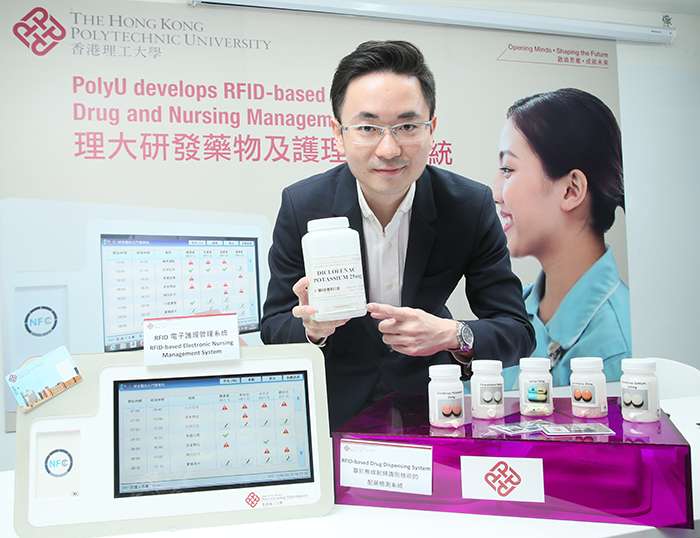RFID-based drug management and electronic nursing service management systems

The Hong Kong Polytechnic University (PolyU) has developed two Radio Frequency Identification (RFID)-based smart healthcare systems, namely 1) a drug management system and 2) an electronic nursing service management system.
The local healthcare industry faces serious challenges of insufficient manpower, a continuously high utilisation rate of medical services, and surging demand for personalised nursing services due to an aging population. To address these issues, frontline healthcare practitioners are under considerable pressure. The Department of Industrial and Systems Engineering of The Hong Kong Polytechnic University (PolyU) has developed two Radio Frequency Identification (RFID)-based smart healthcare systems, namely 1) a drug management system and 2) an electronic nursing service management system. The former system tracks drugs throughout the drug handling processes to ensure accurate drugs replenishing and dispensing to prevent errors in dispensing drugs. The latter is an electronic information system which enables the management, recording and tracking of nursing services information with real-time service monitoring and alert features. It aims to relieve workload and pressure of frontline practitioners, and enhance efficiency and quality of nursing services. Both systems can be used in healthcare institutions including hospitals, infirmary units, rehabilitation centres, elderly nursing homes, clinics, etc.
The systems apply technologies including RFID, Near Field Communication (NFC), cloud computing and Wifi network which are readily available in healthcare institutions. The first system is about HK$0.3 million, and that for the second system is HK$0.7 million, on top of the cost of RFID hardware and tablets installation at HK$40,000 per unit. One of the distinctive features of the systems is it is easy to use, designed in such a way that the systems can seamlessly merge into the daily operations of healthcare services, without affecting the current workflow nor increasing workload. In addition, with its user-friendly interface tailor-made for healthcare workers in different capacities, a real improvement in services efficiency and monitoring capability can be achieved.
Errors made during the process of drug dispensing can lead to serious consequences. PolyU has developed a RFID drug management system to ensure accurate drug dispensing by issuing alerts when expired drugs, error in dispensing, drug allergy, contraindications are detected in the drug dispensing and replenishing processes. This system was tested and used in clinics for one year.
For nursing services, since every patient has different service needs, nurses and frontline healthcare workers have to organise and perform a long list of tasks every day. A system with real-time services monitoring, as well as fast and accurate tracking of service status and information can help avoid mistakes.
Through PolyU's electronic nursing service management system, authorised healthcare workers can have access to service checklists of patients simply by tapping their smart cards on the tablet installed in wards. They will confirm the completion of tasks on the system, and such data will be updated and stored in the centralised database immediately, enabling real-time services monitoring by the management. For outstanding tasks, the system will issue alerts to avoid further delay. In short, it effectively assists healthcare workers to provide services on time and to take immediate remedial actions when negligence, delay, and mishandling are detected.
In addition, the nursing service management system enables instant data search, analysis and report compilation with detailed records of service information, which reduces at least 20 – 30% of the time healthcare workers spent on paper work and data entry. The system also safeguards personal data protection by limiting the access right of different users through the use of NFC smart cards. The electronic nursing system has been implemented in Tuen Mun Nursing Home of Pok Hoi Hospital since 2013. Having successfully reduced the man hours of their healthcare workers on paper work, the system streamlined the operations and improved the overall service quality and efficiency of the nursing home.
















